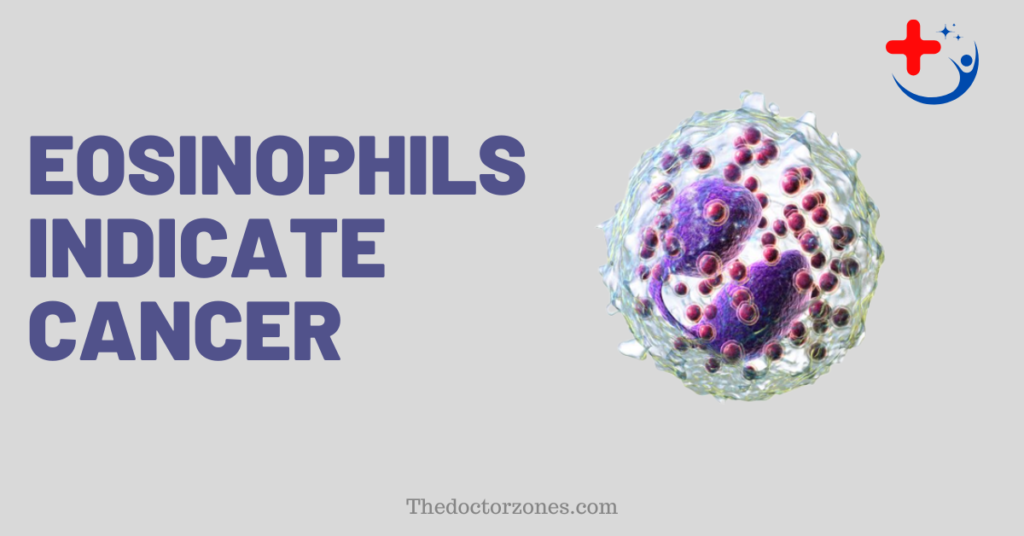What Level Of Eosinophils Indicate Cancer
Eosinophils are a type of white blood cell involved in the immune response, particularly against parasitic infections and allergies. Elevated eosinophil levels, known as eosinophilia, can occur for various reasons, including infections, allergies, autoimmune diseases, and even certain types of cancer. Understanding the role of eosinophils in cancer detection is crucial for accurate diagnosis and treatment.
Understanding Eosinophils and Their Role in the Body
Eosinophils are granule-containing white blood cells that help fight disease. They normally make up 1-4% of white blood cells and are especially useful in warding off infections by parasites. However, they also help fight viruses, fungi, bacteria, and cancers. Eosinophils are primarily responsible for combating infections caused by parasites and participating in allergic responses. Their distinctive feature is the presence of granules containing enzymes and proteins that aid in breaking down and destroying foreign substances in the body.
Normal Range of Eosinophils
The normal range of eosinophils is between 0 to 500 cells per microliter or 1 to 4% of your white blood cell count. When eosinophil levels fall outside this range, it can indicate various health conditions.
- Low Eosinophils: When your eosinophils are 30 cells per microliter or too low, this is a condition called eosinopenia. While you may not have symptoms because other white blood cells also serve as disease-fighting agents, persistent low levels may increase your risk of parasitic infections.
- High Eosinophils: When eosinophils are too high, more than 450 to 500 cells per microliter, it indicates a condition known as eosinophilia. Elevated levels can be caused by various conditions, including infections, allergic reactions, chronic inflammatory diseases, and in some cases, cancer. Read more about: Kyedae reveals cancer diagnosis
Causes of Elevated Eosinophil Levels

Several conditions and events can elevate eosinophils:
- Parasitic Infections: Eosinophils are specially equipped to fight parasite infections. Parasites like worms, lice, and plasmodia can trigger an immune response, leading to increased eosinophil production.
- Drug Allergies: Drugs can trigger allergic reactions that increase eosinophils, including a serious condition known as drug rash with eosinophilia and systemic symptoms (DRESS) syndrome.
- Allergic Conditions: Conditions like asthma, atopic dermatitis, allergic rhinitis, and chronic sinusitis often cause increased eosinophils.
- Chronic Conditions: Connective tissue diseases, certain autoimmune diseases, and rheumatoid illnesses can cause elevated eosinophils.
- Immune Deficiency Syndromes: Syndromes such as Job syndrome, Wiscott-Aldrich syndrome, and Omenn syndrome are associated with increased eosinophils.
- Miscellaneous Conditions: Diseases like Kimura disease, host-graft rejection disease, and cholesterol embolism can also cause elevated eosinophils.
- Cancers: Elevated eosinophils are a feature of certain cancers, including breast, colorectal, ovarian, prostate, cervical, blood, and lymph node cancers.
Eosinophils and Cancer: The Connection
What Level of Eosinophils Indicate Cancer?
Recent medical research has revealed a potential link between elevated eosinophil levels and certain types of cancers. While not a definitive diagnostic marker, an increased eosinophil count can raise suspicion and prompt further investigation. Elevated eosinophil levels alone might not be a definitive indicator of cancer. Cancer diagnosis usually involves a combination of factors, including medical history, physical examination, blood tests, imaging studies, and sometimes biopsies.
Common Cancers Associated with Elevated Eosinophil Levels
- Hodgkin’s Lymphoma
- Stomach Cancer
- Certain Forms of Leukemia
- Breast Cancer
- Colorectal Cancer
- Ovarian Cancer
- Prostate Cancer
- Cervical Cancer
Diagnostic Procedures and Tests

When a patient presents with elevated eosinophil levels, a series of diagnostic procedures and tests are often recommended. These may include:
- Blood Tests: To measure the levels of eosinophils and other white blood cells.
- Imaging Scans: Such as X-rays, CT scans, or MRIs to look for signs of cancer.
- Biopsies: To obtain tissue samples for further analysis.
Interpreting Eosinophil Count Results
Interpreting eosinophil count results requires a comprehensive understanding of the patient’s medical history, symptoms, and additional test findings. A high eosinophil count, in conjunction with other clinical information, can guide healthcare providers toward a more accurate diagnosis.
Factors Beyond Cancer Causing Eosinophilia
Elevated eosinophil levels can also be triggered by factors unrelated to cancer. These include allergic reactions, asthma, eczema, and certain medications. Properly identifying the cause of eosinophilia is essential for effective treatment and management.
Treatment and Management
Should an association between eosinophilia and cancer be established, the treatment approach will depend on the specific cancer type, stage, and individual patient factors. Treatments may range from targeted therapies and chemotherapy to surgical interventions.
Prevention Measures
Maintaining a healthy lifestyle can contribute to preventing abnormal eosinophil levels. Eating a balanced diet, staying active, and avoiding exposure to environmental toxins are all steps that can positively impact overall health and immune function.
Ongoing Research
Ongoing research continues to explore the intricate relationship between eosinophils and cancer. Promising advancements in technology and understanding may eventually lead to more accurate cancer detection methods and improved patient outcomes.
Conclusion
In the intricate web of cancer detection, eosinophils stand as potential sentinels, hinting at the presence of an underlying issue. While not a definitive marker, elevated eosinophil levels warrant attention and further exploration. As medical research advances, we inch closer to unraveling the mysteries of eosinophils, potentially revolutionizing our approach to cancer diagnosis and treatment.
FAQs
Q: Can eosinophilia definitively diagnose cancer?
A: No, eosinophilia is not a definitive diagnostic marker for cancer but can serve as a potential indicator for further investigation.
Q: Can allergies cause elevated eosinophil levels?
A: Yes, allergies and other non-cancerous conditions can lead to elevated eosinophil counts.
Q: Are there any side effects associated with elevated eosinophil counts?
A: Elevated eosinophil counts themselves may not cause symptoms, but underlying conditions responsible for eosinophilia can lead to various symptoms.
Q: Can eosinophil-targeted therapies treat cancer?
A: Eosinophil-targeted therapies are still under research, but they hold potential for future cancer treatment strategies.
Q: What should I do if I have high eosinophil levels?
A: If your eosinophil levels are elevated, consult a healthcare professional for a comprehensive evaluation and appropriate guidance.
This comprehensive guide aims to provide a detailed understanding of the role of eosinophils in cancer detection, offering valuable insights for both healthcare professionals and patients.








